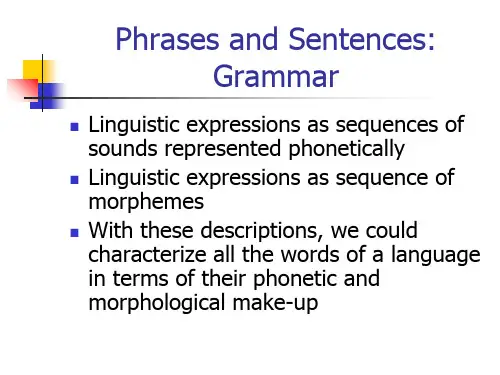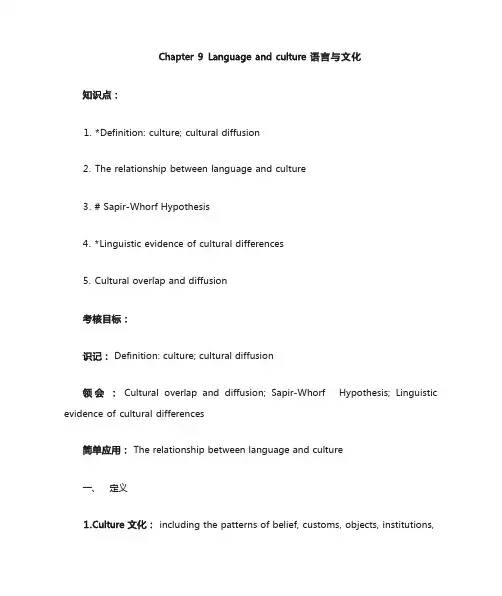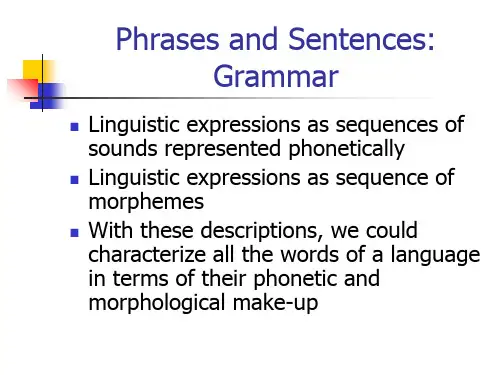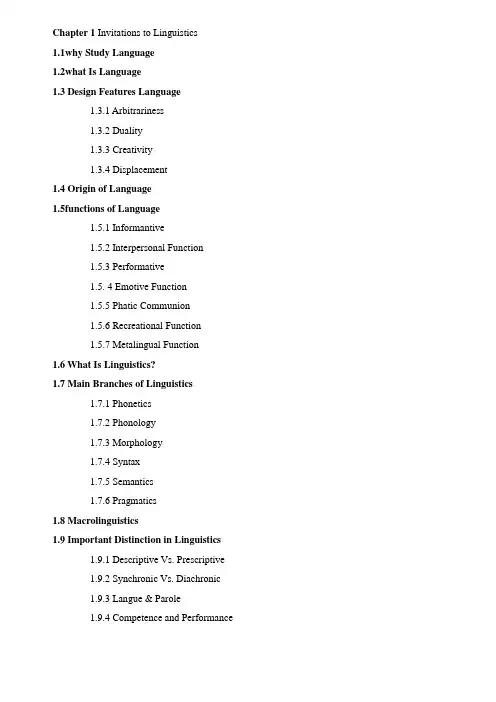英语语言学自编教材第九章
- 格式:doc
- 大小:993.00 KB
- 文档页数:11

Chapter 9 Language and Culture 1.General Introduction1.1 The Relationship between Language and Culture●Relevant Language Use Observations and Questions to Ponder over1) In the following two conversations, the second speaker respondeddifferently towards the same question. And what do you think aChinese speaker will answer the same question?Conversation 1: between English speakersA: I like your sweater!B: Thank you!Conversation 2: between an English speaker and a Frenchspeaker.A: I like your sweater!B: Ah bon? Mais c’est très vieux ! (Oh, really? It’s very old!)2) Look at the following English words. Is there some connection between these words?bash, mash, smash, crash, dash, lash, clash, trash, splash, flash☺ /ʃ/: this sound suggests a sudden, violent movement/action foran English speaker3) The following lines are taken from a Singapore film I Not Stupid. Can you draw a conclusion from what you have read about Singlish?☺ Singlish/Singaporean: an English variety popular in SingaporeMom: Selina, where is all the ang pow that you got for yourbirthday?Selina(Daughter): That’s my money. Why I must give it to youevery time?Terry(Son): Yeah, lah. 为什么都要给你?Mom: 我知道这是你们的钱,but I will help you save, invest, hah. Don’t worry. I will give it back to you when you are old enough.Selina: When can you give it back to us?Terry: I know. 55岁。



英语语言学概论第九章笔记Chapter 9 Psycholinguistics 心理语言学1.The biological foundations of language 语言的生理基础a)The case of Phineas Gage 盖奇案例One afternoon in September 1848, a tragedy happed to Gage. A huge metal rod had gone through the front part of Gage’s brain, but his langua ge abilities were unaffected.The point of this amazing case is that, if our language ability is located in the brain, it is clear that it is not situated right at the front.1848年9月的一个下午,有一名叫菲尼亚斯.盖奇的美国人身上发生了一场悲剧。
一根大铁杆穿过了盖奇的大脑的前部,但他的语言能力却未受影响。
这一令人惊异的案例的意义在于,如果我们的语言能力位于大脑中,很显然不在其头部。
b)The human brain 人的大脑The human brain is the most complicated organ of the body. Lying under the skull, the human brain contains an average of ten billion nerve cells called neurons.人的大脑是人体最复杂的器官,它位于头盖骨下,平均包含有一百亿个神经细胞,即神经元。
The most important part of the brain is the outside surface of the brain, called the cerebral cortex. The cortex is the decision-making organ of the body, receiving messages from all the sensory organs and initiating all voluntary action. Many of the cognitive abilities that distinguish humans from other mammals, such as sophisticated reasoning, linguistic skills, and musical ability, are believed to reside in the cortex.大脑最主要的部分是它的外表面,这一外表面称为大脑皮层。


1. *Definition: culture; cultural diffusion2. The relationship between language and culture3. # Sapir-Whorf Hypothesis4. *Linguistic evidence of cultural differences5. Cultural overlap and diffusionDefinition: culture; cultural diffusionCultural overlap and diffusion; Sapir-Whorf Hypothesis; Linguisticevidence of cultural differencesThe relationship between language and culture一、定义including the patterns of belief, customs, objects, institutions,techniques, and language that characterizes the life of the human community. 由信仰,风俗,目标,机构,技术和语言构成,具有人类社区生活的特征。
through communication, some elements ofcultureA enter cultureB andbecomepartof cultureB. 通过交际, A 文化中的某些成分进入了 B 文化,并成为了 B 文化的一部分。
二、知识点techniques, and language that characterizes the life of the human community. 由信仰,风俗,目标,机构,技术和语言构成,具有人类社区生活的特征。
Twotypes of culture:1. material culture 物质文化: is concrete, substantial and observable. 具体的,实质的,可观察到的( e.g.意识文化、信念、价值观,时空概念)2. spiritual culture 精神文化: is abstract, implicit, and hidden. 抽象的,多义的,不可见的。





Chapter 1 Invitations to Linguistics1.1why Study Language1.2what Is Language1.3 Design Features Language1.3.1 Arbitrariness1.3.2 Duality1.3.3 Creativity1.3.4 Displacement1.4 Origin of Language1.5functions of Language1.5.1 Informantive1.5.2 Interpersonal Function1.5.3 Performative1.5. 4 Emotive Function1.5.5 Phatic Communion1.5.6 Recreational Function1.5.7 Metalingual Function1.6 What Is Linguistics?1.7 Main Branches of Linguistics1.7.1 Phonetics1.7.2 Phonology1.7.3 Morphology1.7.4 Syntax1.7.5 Semantics1.7.6 Pragmatics1.8 Macrolinguistics1.9 Important Distinction in Linguistics1.9.1 Descriptive Vs. Prescriptive1.9.2 Synchronic Vs. Diachronic1.9.3 Langue & Parole1.9.4 Competence and PerformanceChapter 2 Speech Sounds2.1 How Speech Sounds Are Made?2.1.1 Speech Organs2.1.2 The IPA2.2 consonants and Vowels2.2.1 Consonants2.2.2 V owels2.2.3 The Sounds of English2.3 From Phonetics to Phonology2.3.1 Coarticulation and Phonetic Transcription2.3.2 Phonemes2.3.3 Allophones2.4 Phonological Processes, Phonological Rules and Distinctive Features2.4.1 Assimilation2.4.2 Epenthesis, Rule Ordering, and the Elsewhere Condition2.4.3 Distinctive Features2.5 Suprasegmentals2.5.1 The Syllable Structure2.5.2 Stress2.5.3 Intonation2.5.4 ToneChapter 3 From Morpheme To Phrase3.1 What Is Morpheme3.1.1 Morpheme and Morphology3.1.2 Types of Morphemes3.1.3 Morphological Change and Allomorph 3.2 What Is Word?3.2.1Word and Lexical Items3.2.2 Classification of Words3.3 Word Formation (1): From Morpheme to Word3.3.1 The Inflectional Way of Formation3.3.2The Derivational Way of Formation 3.4 Word Formation (2): Lexical Change3.5 Word Group and PhraseChapter 4 From Word To Text4.1 Syntactic Relation4.1.1The Positional Relation4.1.2Relation of Substitubility4.1.3Relation of Co-Occurrence4.2 Grammatical Construction and Its Constituents4.2.1 Grammatical Construction4.2.1 Immediate Constituents4.2.3 Endocentric and Exocentric Constructions4.2.4 Coordination and Subordination4.3 Syntactic Function4.3.1Subject4.3.2Predicate4.3.3Object4.3.4The Relation between Classes and Functions 4.4 Category4.4.1 Number4.4.2 Gender4.4.3 Case4.4.4 Agreement4.5 Phrase,clause,sentence4.5.1 Phrase4.5.2 Clasue4.5.3 Sentence4.6 Recursiveness4.6.1Conjoining4.6.2 Embedding4.7 Beyond the Sentence4.7.1 Sentential Connection4.7.2 CohesionChapter5 meaning5.1 Meanings of MEANING5.2 The Referential Theory5.3 Sense Relations5.3.1 Synonymy5.3.2 Antonymy5.3.3 Hyponymy5.4 Componential Analysis5.5 Sentence Meaning5.5.1 An Integrated Theory5.5.2 Logical SemanticsChapter 6 Language and Cognition6.1 What Is Cognition?6.2 What Is Psycholinguistics?6.2.1 Language Acquisition6.2.2 Language Comprehension6.2.3 Language Production6.3 What Is Cognitive Linguistics?6.3.1 Construal and Construal Operations6.3.2 Categorization6.3.3 Image Schemas6.3.4 Metaphor6.3.5 Metonymy6.3.6 Blending TheoryChapter 7 Language, Culture and Society7.1 Language and Culture7.1. 1How Does Language Relate To Culture7.1.2 More about the Sapir-Whorf Hypothesis7.1.3 Case Studies7.1.4 To Which Extent Do We Need Culture in Our Linguistic Study7.1.5 Culture in Language Teaching Classroom7.2 Language and Society7.2.1 How Does Language Relate to Society7.2.2 A Situationally and Socially Variationist Perspective7.2.3 What Should We Know About Sociolinguistics?7.2.4 What Implications Can We Get From Sociolinguistics?7.3 Cross-Culture Communication7.3.1 What Should We Know All About Cross-Culture Communication?7.3.2 Case Studies7.4 SummaryThe Chapter 8 Language in Use8.1 Speech Act Theory8.1.2 Performatives and Constatives8.1.3 A Theory of Illocutionary Act 8.2 The Theory of Conversational Implicature8.2.1 The Cooperative Principle8.2.2 Violation of the Maxims8.2.3 Characteristics of Implicature 8.3 Post-Gricean Development8.3.1 Relevance Theory8.3.2 The Q- And R-Principles8.3.3 The Q-, I- And M-Principles9.2 Some General Features of the Literary Language9.2.1 Foregrounding and Grammatical Form9.2.2 Literal Language and Figurative Language 9.3 The Language in Poetry9.3.1 Sound Patterning9.3.2 Different Forms of Sound Patterning9.3.3 Stress and Metrical Patterning9.3.4 Conversational Forms of Metre and Sound9.3.5 The Poetic Functions of Sound and Metre9.3.6 How to Analyse Poetry9.4 The Language in Fiction9.4.1 Fictional Prose and Point Of View9.4.2 Speech and Thought Presentation9.4.3 Prose Style9.4.4 How to Analyse the Language of Fiction 9.5 The Language in Drama9.5.1 How Should We Analyse Drama9.5.2 Analysing Dramatic Language9.5.3 How to Analyse Dramatic Texts?9.6 The Cognitive Approach to Literature9.6.1 Theoretical Background9.6.2An Example of Cognitive Analysis10.1 Computer-Assisted Language Learning (CALL)10.1.1 CAI/CAL vs CALL10.1.2 Phases of CALL Development10.1.3 Technology10.2 Machine Translation10.2.1 History of Development10.2.2 Research Methods10.2.3 MT Quality10.2.4 MT and the Internet10.2.5 Speech Translation10.2.6 MT and Human Translation10.3 Corpus Linguistics10.3.1 Definition10.3.2 Criticism and Revival of Corpus Linguistics10.3.3 Concordance10.3.4 Text Encoding and Annotation10.3.5 The Roles and Corpus Data10.4 Computer Mediated Communication10.4.1 Mail and News10.4. 2 PowerPoint10.4.3 Blog10.4.4 Chatroom10.4.5 Emoticons and SmileysChapter 11 Linguistics and Foreign Language Teaching11.1 The Relation between Linguistics and Language Teaching 11.2 Linguistics and Language Learning11.2.1 Grammar and Language Learning11.2.3 Input and Language Learning11.2.4 Interlinguage in Language Learning11.3linguistics and Language Teaching11.3.1 The Discourse-Based View of Language Teaching11.3.2 The Universal Grammar and Language Teaching 11.4 Linguistics and Syllabus Design11.4.1 A Clarification of Terms: Syllabus and Curriculum11.4.2 Theoretical Views behind Syllabus Design11.4.3 Types of Syllabus11.4.4 Components of Syllabus11.4.5 Current Trends in Syllabus Design11.5 Contrastive Analysis and Error Analysis11.5.1 Contrastive Analysis (CA)11.5.2 Error Analysis (EA)11.6 Corpus Linguistics and Language Teaching11.6.1Types of Corpora11.6.2What Uses Can We Make Of Corpora?11.7 SummaryChapter 12 Theories and Schools of Modern Linguistics 12.0 Introduction12.1the Plague School12.1.1 Introduction12.1.2 Phonology and Phonological Oppositions12.1.3 Functional Sentence Perspective (FSP) 12.2 The London School12.2.1 Malinowski’s Theory12.2.2 Firth’s Theory12.2.3 Holliday and Systemic-Functional Grammar 12.3 American Structuralism12.3.1 Early Period: Boas and Sapir12.3.2 Bloomfield’s Theory12.3.3 Post-Bloomfieldian Linguistics12.4 Transformational-Generative Grammar12.4.1 The Innateness Hypothesis12.4.2 What Is Generative Grammar12.4.3 The Classical Theory12.4.4 The Standard Theory12.4.5 The Extended Standard Theory12.4.6 The Government and Binding Theory12.4.7 The Minimalist Theory And After12.4.8 Chomsky’s Fundamental Contribution12.5 Revisionist or Rebels12.5.1 Case Grammar12.5.2 Generative Semantics。
Unit 9 the Use of English(II)I. Decide whether each of the following statements is true or false:1. The meaning of a sentence is abstract, but context-dependent.2. Both semantics and pragmatics study how speakers of a language use sentences to effect successful communication3. Maxim of quantity requires one to provide as much information as possible.4. In order to be polite, one needs to cooperate in all possible ways.5. Every normal speaker needs to mind his own and others’ face.6. Politeness is a matter of degree.7. Cultures vary as far as politeness issues are concerned.8. “Do not say what you believe to be false” falls into the maxim of quality.9. “To avoid obscurity” belongs to the maxim of relation.10. “Make your contribution such as is re quired, at the stage at which it occurs, by the accepted purpose of the talk exchange in which you are engaged.” This was said by G. N. Leech.1.F2.F3. F 4 F 5 T 6 T 7 T 8 T 9. F 10. FIII. There are four choices following each statement. Mark the choice that can best complete the statement:1. _________ does not study meaning in isolation, but in context. A. Pragmatics B. Semantics C. Sense relationD. Concept2. Which of the following is true?A. Utterances usually do not take the form of sentences.B. Some utterances cannot be restored to complete sentences.C. No utterances can take the form of sentences.D. All utterances can be restored to complete sentences.3. __________ is advanced by Paul Grice A. Cooperative Principle B. Politeness PrincipleC. The General Principle of Universal GrammarD. Adjacency Principle4. When any of the maxims under the cooperative principle is flouted, _______ might arise.A. impolitenessB. contradictionsC. mutual understandingD. conversational implicatures5. Which of the following utterances below is performative?A. I command you to put out that cigarette.B. I warned you not to go.C. Put your toys awayD. I envy you1. A2. B3. A4. D5. AUnit 10 The Varieties of English (I)I. Decide whether each of the following statements is true or false:1. Language as a means of social communication is a homogeneous system with a homogeneous group of speakers.2. The kind of name or term speakers use to call or refer to someone may indicate something of their social relationshipto or personal feelings about that individual.3. Language use varies from one speech community to another, from one regional group to another, from one social group toanother, and even from one individual to another.4. The goal of sociolinguistics is to explore the nature of language variation and language use among a variety of speechcommunities and in different social situations.5. The linguistic markers that characterize individual social groups may serve as social markers of group membership.6. The use of euphemisms has the effect of removing derogatory overtones and the disassociative effect as such is usuallylong-lasting.7.Sociolinguistics is the sub-discipline of linguistics that studies social contexts.8.Two speakers of the same language or dialect use their language or dialect in the same way.9.Geographical barriers are the only source of regional variation of language.10. A person’s social backgrounds do not exert a shaping influence on his choice of linguistic features1. F2.T3.T4.T5. F6.F7.F8.F9.F 10. FIII.There are four given choices for each statement below. Mark the choice that can best complete the statement:1. The meaning of language was considered as something _______ in traditional semantics.A. contextualB. behaviouristicC. intrinsicD. logical2. _______ are language varieties appropriate for use in particular speech situation.A. SlangB. Address termsC. RegistersD. Education varieties3. ________ is speech variation according to the particular area where a speaker comes from.A. Regional variationB. Language variationC. Social variationD. Register variation4. A ____ is a variety of language that serves as a medium of communication among groups of people for diverse linguisticbackgrounds.A. lingua francaB. registerC. CreoleD. national language5. Although _______ are simplified languages with reduced grammatical features, they are rule-governed, like any humanlanguage.A. vernacular languagesB. creolesC. pidginsD. sociolects6. Probably the most widespread and familiar ethnic variety of the English language is _______.A. British EnglishB. American EnglishC. Black EnglishD. Australian English7. In normal situations, ____ speakers tend to use more prestigious forms than their ____ counterparts with the same socialbackground.A. female; maleB. male; femaleC. old; youngD. young; old8. _______ is concerned with the social significance of language variation and language use in different speech communities.A. PsycholinguisticsB. SociolinguisticsC. Historical linguisticsD.General linguistics9. _______ in a person’s speech, or writing, usually ranges on a continuum from casual to formal according to the typeof communicative context.A. Regional variationB. Social variationC. Stylistic variationD. Idiolectal variation10. _________ means that certain authorities, such as the government, choose a particular speech variety, standardize itand spread the use of it across regional boundaries.A. Language interferenceB. Language changesC. Language planningD. Language transfer1. C2. C3.A4.A5. C6.C7.A8.B 9D 10.CUnit 11 The Varieties of English (II)I. Decide whether each of the following statements is true or false:1. In the most bilingual communities, two languages have the same in speech situations known as domains.2. A regional variety of a language is intrinsically inferior to the standard variety of that language.3. The standardization of a particular dialect in relation to one or more vernaculars is the result of a deliberate government policy.4. A pidgin is not a native language of a particular region.5. When a bilingual speaker switches between the two languages concerned, he is converting one mode of thinking into the other.6. The most distinguishable linguistic feature of a regional dialect is its grammar and uses of vocabulary7. The standard language is a better language than nonstandard languages.8. A lingua franca can only be used within a particular country for communication among groups of people with different linguistic backgrounds.9. A pidgin usually reflects the influence of the higher, or dominant, language in its lexicon and that of the lower languagein their phonology and occasionally syntax.10. African-American Vernacular English is an inferior dialect of English.11. Pidgin English no longer exists today.12. Some people speak a Creole as their mother tongue.13. British English and American English are identical in grammar but different in vocabulary.l.F 2.F 3.F 4.T 5.F 6.F 7.F 8.F 9.T 10.F 11. F 12. T. 13. FIII. There are four choices following each statement. Mark the choice that can best complete the statement:1. _______ are the major source of regional variation of language.A. Geographical barriersB. Loyalty to and confidence in one’s native speechC. Physical discomfort and psychological resistance to changeD. Social barriers2. A linguistic ____ refers to a word or expression that is prohibited by the "polite" society from general use. A. slangB. euphemismC. jargonD. taboo3. _______ is not a typical example of official bilingualism.A. CanadaB. FinlandC. BelgiumD. Germany4. In a speech community people have something in common _______ --a language or a particular variety of language and rulesfor using it.A. socially B. linguistically C. culturally D. pragmatically5. _______ is defined as any regionally or socially definable human group identified by shared linguistic system.A. A speech community B. A race C. A society D.A country6. The most recognizable differences between American English and British English are in _______and vocabulary.A. diglossiaB. bilingualismC. pidginizationD. blending7. _______ is a causal use of language that consists of expressive but nonstandard vocabulary, typically of arbitrary, flashyand often ephemeral coinages and figures of speech.A. Language taboo B. Slang C. Address terms D. Register varietyIII. There are four choices following each statement. Mark the choice that can best complete the statement:1. _______ are the major source of regional variation of language.A. Geographical barriersB. Loyalty to and confidence in one’s native speechC. Physical discomfort and psychological resistance to changeD. Social barriers2. A linguistic ____ refers to a word or expression that is prohibited by the "polite" society from general use. A. slangB. euphemismC. jargonD. taboo3. _______ is not a typical example of official bilingualism.A. Canada B. Finland C. Belgium D. Germany4. In a speech community people have something in common _______ --a language or a particular variety of language and rulesfor using it.A. socially B. linguistically C. culturally D. pragmatically5. _______ is defined as any regionally or socially definable human group identified by shared linguistic system.A. A speech community B. A race C. A society D.A country6. The most recognizable differences between American English and British English are in _______ and vocabulary.A. diglossiaB. bilingualismC. pidginizationD. blending7. _______ is a causal use of language that consists of expressive but nonstandard vocabulary, typically of arbitrary, flashyand often ephemeral coinages and figures of speech.A. Language taboo B. Slang C. Address terms D. Register variety。
戴炜栋《新编简明英语语⾔学教程》(第2版)笔记和课后习题(含考研真题)详解(第7章语⾔变化——第9第7章语⾔变化7.1 复习笔记本章要点:1. Phonological Change⾳系变化2. Morphological and syntactic change形态和句法变化3. Lexical and semantic change词汇和语义变化本章考点:新词的增加(创新词,缩略词,紧缩法,词⾸字母缩略词,逆构词法);词义的变化(意义扩⼤,意义缩⼩,意义转换)。
本章内容索引:I. Definition of historical linguisticsII. Phonological ChangeIII. Morphological and syntactic change1. Addition of affixes2. Loss of affixes3. Chang of word order4. Chang in negation ruleIV. Lexical and semantic change1. Addition of new words(1) Coinage(2) Clipped words(3) Blending(4) Acronyms(5) Back-formation(6) Functional shift(7) Borrowing2. Loss of words3. Semantic Changes(1) Semantic broadening(2) Semantic Narrowing(3) Semantic shiftV. Some recent trends1. Moving towards greater informality2. The influence of American English3. The influence of science and technology(1) Space travel(2) Computer and internet language(3) EcologyVI. Causes of language changeI. Definition of historical linguistics(历史语⾔学的定义)Historical linguistics, as a branch of linguistics, is mainly concerned with both the description and explanation of language changes that occurred over time.历史语⾔学是语⾔学的⼀个分⽀,主要研究语⾔随着时间的变化⽽产⽣的变化与变化的原因。
简明新编英语语言学教程教案第一章:英语语言学概述1.1 教学目标了解英语语言学的定义、研究范围和重要性。
掌握英语语言学的基本概念和术语。
1.2 教学内容英语语言学的定义和研究范围。
语言、言语和语言学的区别。
英语语言学的主要分支和理论。
1.3 教学方法讲授和讨论相结合,介绍英语语言学的基本概念。
通过案例分析和实例讲解,帮助学生理解语言学的实际应用。
1.4 教学评估课堂讨论和提问,了解学生对英语语言学的理解程度。
课后作业,要求学生编写简短的英语语言学小论文。
第二章:语音学2.1 教学目标了解语音学的定义和研究内容。
掌握基本的语音学知识和术语。
2.2 教学内容语音学的定义和研究内容。
音素、音位和音标的概念。
英语音素的分类和特点。
2.3 教学方法讲授和示范相结合,介绍语音学的基本概念。
通过听力和发音练习,帮助学生掌握英语音素的发音。
2.4 教学评估课堂发音练习和听力测试,了解学生对语音学的掌握程度。
课后作业,要求学生分析和描述英语单词的发音特点。
第三章:词汇学3.1 教学目标了解词汇学的定义和研究内容。
掌握词汇学的基本知识和术语。
3.2 教学内容词汇学的定义和研究内容。
词根、词缀和词性的概念。
英语词汇的构成和变化。
3.3 教学方法讲授和讨论相结合,介绍词汇学的基本概念。
通过词汇练习和词根记忆法,帮助学生扩展英语词汇量。
3.4 教学评估课堂词汇练习和词根记忆法展示,了解学生对词汇学的掌握程度。
课后作业,要求学生分析和解释英语单词的构成和变化。
第四章:语法学4.1 教学目标了解语法学的定义和研究内容。
掌握语法学的基本知识和术语。
4.2 教学内容语法学的定义和研究内容。
句子结构、词类和时态的概念。
英语语法的规则和用法。
4.3 教学方法讲授和练习相结合,介绍语法学的基本概念。
通过句子结构和时态练习,帮助学生掌握英语语法的规则。
4.4 教学评估课堂语法练习和句子结构分析,了解学生对语法学的掌握程度。
课后作业,要求学生编写简短的英语语法分析文章。
Chapter 9 Language and Culture 1.General Introduction1.1 The Relationship between Language and Culture●Relevant Language Use Observations and Questions to Ponder over1) In the following two conversations, the second speaker respondeddifferently towards the same question. And what do you think aChinese speaker will answer the same question?Conversation 1: between English speakersA: I like your sweater!B: Thank you!Conversation 2: between an English speaker and a Frenchspeaker.A: I like your sweater!B: Ah bon? Mais c’est très vieux ! (Oh, really? It’s very old!)2) Look at the following English words. Is there some connection between these words?bash, mash, smash, crash, dash, lash, clash, trash, splash, flash☺ /ʃ/: this sound suggests a sudden, violent movement/action foran English speaker3) The following lines are taken from a Singapore film I Not Stupid. Can you draw a conclusion from what you have read about Singlish?☺ Singlish/Singaporean: an English variety popular in SingaporeMom: Selina, where is all the ang pow that you got for yourbirthday?Selina(Daughter): That’s my money. Why I must give it to youevery time?Terry(Son): Yeah, lah. 为什么都要给你?Mom: 我知道这是你们的钱,but I will help you save, invest, hah. Don’t worry. I will give it back to you when you are old enough.Selina: When can you give it back to us?Terry: I know. 55岁。
Mom: Terry,you think you very funny, is it? Stop talking nonsense. Ai, girl, do you really think it that ai suitable for your room, huh? Don’t you think that this is much nicer? See, ai, make of cane, na.Selina: Mom, I thought you see that I can decorate my own room in any way I want? I want to try this one. I don’t like that one, that’s old-fashioned.Mom: Yes, yes.Selina: So can I do it in my own way, please?Mom: I know. Whatever I say you won’t like it. But one day you will appreciate it. This is for your own good. Trust me, hah!●Summaries to Make and Linguistic Viewpoints to LearnEvery language is inseparable from a culture; it has to serve and reflect cultural needs. People from different cultural background find themselves with different customs, such as the different responses to the same compliment in the above observation. Culture, on the other hand, is constantly conditioning language with time, take the Singaporean for example, they have covered a long way to shape in form their own language; and it is too rash for us to take it for granted that their language is simply a variety of the English language. Language expresses, embodies and symbolizes cultural reality (Claire Kramsch: 2000), which we can find good illustration in onomatopoeias. Can you find other examples to demonstrate the relationship between culture and language?The word “culture”, in its origin, means to cultivate, which can be taken to refer to any human knowledge. Any language will be unintelligible once it is taken out of the appropriate cultural context. The following quote, from the linguist F. de Saussure’s book Course in General Linguistics, is an explanation of the relationship between culture and language.F. de Saussure (1857-1913)—It is the social part of the language, external to the individual, who by himself is powerless either to create it or to modify it. It exists only in virtue of a kind of contract agreed between the members of a community.●Definitions to ClarifySpeech community: That is composed of people who use thesame linguistic code;Discourse communities: The common ways in which members of a social group use language to meet their social needs.1.2 The Sapir-Whorf Hypothesis● Relevant Language Use Observations and Questions to Ponder over1) While Whorf was working as a fireinsurance risk assessor, he noticed that the waypeople behaved toward things was oftendangerously correlated to the way these thingswere called. For example, the sight of the sign“EMPTY”on empty gasoline drums wouldprompt passersby to toss cigarette butts into these drums, notrealizing that the remaining gasoline fumes would be likely tocause an explosion. In this case, the English sign “EMPTY” evoked a neutral space, free of danger.2) As Chinese speakers learning English as a foreign language, it is not rare for theteacher to catch them misusing “he” and “she” in oral English practice. In comparison, French speakers are used to attaching gender to most of the objects in their lives. For example, le chocolat (chocolat), la lettre (letter), le téléphone (telephone), la radio (radio).What do you think is the possible reason for this phenomenon?● Summaries to Make and Linguistic Viewpoints to LearnIn their study of American Indian languages, the American linguist Edward Sapir and his pupil Benjamin Lee Whorf had hypothesized that language has a relatively strong impact on its speakers’ mode of thought. The strong version oftheir hypothesis is named linguistic determinism. It posits thatlanguage determines the way we think, or in other words, we actuallylive in language instead of other way round. Today, it is generallybelieved that the strong version denies our activity in learning tounderstand people from different speech communities. For instance,though it is true that the Chinese language doesn’t attach gender to its characters, it is definitely false to assume that Chinese-users are unable to adopt the French vocabulary with the correct gender attached to it. What’s more, most of the linguists refuted the strong version by claiming that if Sapir were right with his theory, then how could he successfully understand the native languages spoken by AmericanIndians?The weak version that is generally accepted nowadays proposed that there are cultural differences in the semantic associations evoked by seemingly common concepts. For instance, a Chinese professor, in his speech on Chinese characters, once suggested that the character “笑” is related to a smiling face immediately while other foreign words, say, smile, sourire, わらう, can not. In Professor Claire Kramsch’s book, he noticed a German woman farmer who believed that the German language isa much more natural and correct expression of one’s emotions or thoughts.2. Cross-Cultural Communication2.1 Meaning as Sign●Relevant Language Use Observations and Questions to Ponder over1) Please compare the following two groups of words:A: laugh, smile, grin, giggle, beamB: 大笑、微笑、咧开嘴笑、咯咯地笑、眉开眼笑It is obvious that the Chinese language encodes the physical facialexpression through one sign—“笑”, but the English language adopts a richer vocabulary for the same expression. Different signs denote reality by cutting it up in different ways.2) A: What is the Chinese equivalent for the English word “hell”?B: 地狱,I think.Question: Do you think that “hell” and “地狱”evoke the same associations in your mind? Do you think they share the same connotation?3) Do you notice different onomatopoeias in different languages? What are the echoic words used in English and Chinese to refer to a loud sound made by a rooster?4) Although it is believed that different languages predispose their speakers to viewreality in different ways through the different metaphors they use, more similarities can be found cross different languages.a. ARGUMENT IS WAR.b. 唇枪舌剑;舌战群儒a. To think out of box.b. 不落窠臼a. A man never goes back upon his own word.b. 大丈夫一言既出,驷马难追。